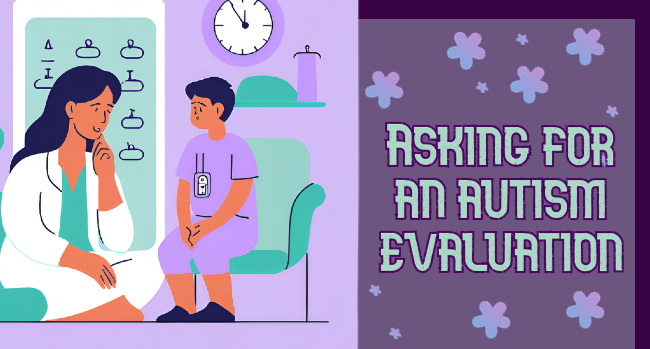When you suspect your child may be on the autism spectrum, it can feel like a whirlwind of emotions—fear, anxiety, and sometimes even relief that you’re beginning to understand your child a little more. As a mom of a nonverbal 11-year-old with autism, I’ve been exactly where you are right now. It’s overwhelming, and that’s completely okay. The first big step in this journey is talking to your pediatrician about an autism evaluation. While it can seem daunting, I’m here to walk you through it.
How do you talk to your child’s pediatrician about an autism evaluation and what should you expect? Keep reading, we’ll dive into it.
Preparing For The Autism Evaluation Conversation
Before you set foot in the doctor’s office, it’s important to take some time to prepare. Start by writing down specific behaviors or concerns you’ve noticed in your child. Maybe your child isn’t making eye contact, isn’t speaking at the same rate as other children, or has certain repetitive behaviors.
Whatever you’ve observed, make a note of it. These details will help guide the conversation with your pediatrician and ensure you don’t forget anything in the moment.

When I first brought up concerns about my son, I was nervous that I might be overreacting, but trust me—you know your child better than anyone. Your observations are valid and important.
When our son was developmentally delayed and not sleeping, we really didn’t know much about autism. It was actually talking to our pediatrician about our concerns that resulted in him bringing up the possibility of autism. This resulted in my son getting diagnosed with autism much younger than a child typically would. I am forever grateful to this pediatrician for hearing my concerns.
How To Ask For An Autism Evaluation
The key to a productive conversation is clarity. Be direct, but also allow space for a two-way discussion. You might feel intimidated, but remember that your pediatrician is there to help.
Here’s how you can start:
1. Be Honest About Your Concerns
When you sit down with your pediatrician, don’t shy away from expressing your concerns. You can start with something like, “I’ve noticed some behaviors in my child that concern me, and I’d like to discuss whether an autism evaluation might be appropriate.”
It’s important to be specific about what you’ve observed, which is where that list you made will come in handy.
2. Ask Directly For An Autism Evaluation
Don’t hesitate to be straightforward. It’s okay to say, “I’d like to request an autism evaluation.” If your pediatrician is experienced in developmental milestones, they’ll likely ask you follow-up questions to understand your concerns better.
Some pediatricians may even bring up the idea of developmental testing before you do, but if not, don’t be afraid to initiate the conversation. (This is what happened to us.)
Your pediatrician bringing it up first is almost a bit of a gut punching experience. I remember being in the parking lot and wondering what I did wrong. Why was this happening to my son? Take a deep breath if you are in this situation, mama. You did nothing wrong. It will be alright.
What Happens After You Ask?
Once you’ve asked for an autism evaluation, your pediatrician will likely start by asking about your child’s development and behavior. They may perform some initial screening in the office, but the formal evaluation typically involves a referral to a specialist like a developmental pediatrician or a child psychologist.
Don’t feel discouraged if your pediatrician refers you elsewhere—this is a standard part of the process.
In my case, my pediatrician was supportive, but we still had to go through several referrals and wait for specialist appointments. Be prepared for this—it’s normal, even though it can be frustrating. The waiting can be the hardest part, but every step is progress. (It took about three months before my son got his evaluation).
Trust Your Instincts
As moms, we often second-guess ourselves, especially when it comes to our children. But if there’s one piece of advice I can give you, it’s this: trust your instincts. You know your child better than anyone else. If something feels off, don’t ignore it. Your gut feeling is a powerful tool.

The information in this post is solely for educational purposes and should not be considered medical advice. Please consult your primary physician regarding implementation of strategies or treatments for your child.
In my experience, I initially worried I might be overreacting when I started to notice my son’s delays. But deep down, I knew something wasn’t quite right. That feeling prompted me to push for answers and to advocate for him. Don’t let anyone—whether it’s a well-meaning friend, a family member, or even your pediatrician—convince you to ignore your concerns if they feel valid to you. Your intuition is one of your strongest assets in this process.
Don’t Worry About Being Wrong
One of the most common fears many moms have when starting the autism evaluation process is, “What if I’m wrong?” What if you push for an evaluation, and it turns out your child isn’t on the spectrum after all?
Let me reassure you—there’s no harm in being wrong. You’re doing exactly what a caring, proactive parent does: seeking clarity about your child’s development. If the evaluation doesn’t result in an autism diagnosis, you’ll still gain valuable insight into your child’s needs. Either way, you’ll have taken a big step toward understanding how to best support them.
Remember, it’s better to ask the hard questions and get clarity than to stay in the dark. When I sought out an evaluation for my son, I was nervous about wasting the doctor’s time or causing unnecessary stress, but that fear vanished once I realized how important it was to get answers, no matter what those answers turned out to be.
What if Your Pediatrician Doesn’t Agree?
Occasionally, you might encounter a pediatrician who doesn’t see the need for an immediate evaluation. This can be incredibly frustrating, especially when you’re already anxious about your child’s development.
If this happens, don’t give up. You have the right to seek a second opinion. If your gut is telling you something is off, trust it. Many moms I know have had to push for answers, myself included.
I can’t tell you how many times I’ve butted heads with doctors over the years with my son. It happens. Ultimately, you know your child better than anyone else. Yes, you are not a doctor. But, you have a voice and it is important that your voice is heard. This is especially true in my case as I am my son’s voice given that he is nonverbal.
The Next Steps in the Diagnosis Process
After the evaluation, if your child is diagnosed with autism, your journey will continue. The next step will involve learning about therapies, educational support, and how to best advocate for your child’s needs. It can feel overwhelming, but remember that you’re not alone. There are resources, support groups, and professionals who will help guide you.
Final Thoughts
Talking to your pediatrician about an autism evaluation is a big, sometimes scary step, but it’s one worth taking. As a mom who’s walked this path, I know it can feel overwhelming, but you’re doing exactly what your child needs by advocating for them. Be prepared, be persistent, and trust your instincts. You’re the best advocate your child could have, and every step you take brings you closer to the answers and support your family deserves.





















